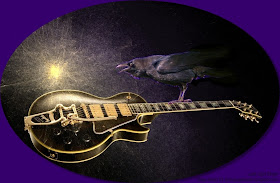"It is your omen, only you know the meaning. To me, it is but another star in the night."
~ Gerald R. Stanek, The Eighth House
Mage Music 63
Reality communicates with us constantly. Reality can slap us in the face with a power chord, a car skidding into a tree, blood coming from a wound - or it can come at us more subtly through signs, omens and portents. Omens and portents are symbols that represent possibilities and guidance for choices, if only the meanings can be understood. Unfortunately the logical, analytic part of the human mind is not so good at interpretation. That’s because symbolism is emotional and therefore not the job of the thinking mind.
Gods are an example of symbols. They don't represent the Universe directly; they represent aspects of the universe that have meaning for humans. When Raven appears in the aspect (god, avatar or interpretation) of Lugh, Apollo, Odin, Morrigan, Mercury, any number of Native American or other cultural forms, for example, Raven can symbolize messenger, prophecy, thought and memory, warfare, arts and sciences, guardian, creator or trickster. The broad spectrum of cultural and mythological meanings for Raven or any of the gods or avatars do not lessen the value of their symbolism, but rather allows the meanings to be personalized and therefore more powerful. Thus what Raven or any god or avatar - or any omen or portent - means will not be the same for me as for you, and therein dwells their value.
Understanding the messages of the gods or of the Universe itself in the form of omens and portents is seated in willingness to open to pathways of knowledge that bypass the thinking mind and access the intuitive, emotional mind to provide meaning. Once these pathways are open, personal cultural history and life experience will provide a framework for the concepts elicited by the omens.
Raven appears: What is he for you, me or Mage? For the logical, analytic mind, a bird - perhaps at most carrying a mythological association. But Raven is more even than Ildánach "skilled in many arts", Lleu Llaw Gyffes "The Bright One with the Strong Hand", champion of artistry and skills, bringer of messages of beauty and light - though it is up to each person to discover the meaning of the message Raven embodies.
~ Gerald R. Stanek, The Eighth House
Mage Music 63
 |
| Click to enlarge |
Reality communicates with us constantly. Reality can slap us in the face with a power chord, a car skidding into a tree, blood coming from a wound - or it can come at us more subtly through signs, omens and portents. Omens and portents are symbols that represent possibilities and guidance for choices, if only the meanings can be understood. Unfortunately the logical, analytic part of the human mind is not so good at interpretation. That’s because symbolism is emotional and therefore not the job of the thinking mind.
Gods are an example of symbols. They don't represent the Universe directly; they represent aspects of the universe that have meaning for humans. When Raven appears in the aspect (god, avatar or interpretation) of Lugh, Apollo, Odin, Morrigan, Mercury, any number of Native American or other cultural forms, for example, Raven can symbolize messenger, prophecy, thought and memory, warfare, arts and sciences, guardian, creator or trickster. The broad spectrum of cultural and mythological meanings for Raven or any of the gods or avatars do not lessen the value of their symbolism, but rather allows the meanings to be personalized and therefore more powerful. Thus what Raven or any god or avatar - or any omen or portent - means will not be the same for me as for you, and therein dwells their value.
Understanding the messages of the gods or of the Universe itself in the form of omens and portents is seated in willingness to open to pathways of knowledge that bypass the thinking mind and access the intuitive, emotional mind to provide meaning. Once these pathways are open, personal cultural history and life experience will provide a framework for the concepts elicited by the omens.
Raven appears: What is he for you, me or Mage? For the logical, analytic mind, a bird - perhaps at most carrying a mythological association. But Raven is more even than Ildánach "skilled in many arts", Lleu Llaw Gyffes "The Bright One with the Strong Hand", champion of artistry and skills, bringer of messages of beauty and light - though it is up to each person to discover the meaning of the message Raven embodies.
When the mind is open to opens and portents, everything is meaningful. How much meaning you can grasp is up to you, and what the meaning is will be meaning for you alone.
This is how to understand the message that music brings when delivered by a Mage. Only you can know what the message is. The Mage has his own purpose, which is not yours. Open your arms and let the meaning come running in.
♫



